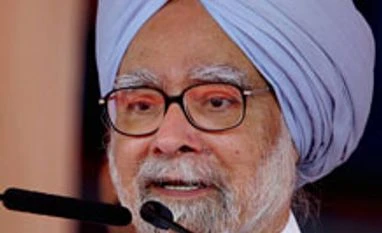Opposition leaders, security analysts and experts have questioned the UPA Government's reported move to attempt a dilution of the Nuclear Liability Bill (NLB) to suit the needs of the U.S. Government and American firms interested in taking bilateral nuclear commerce with India forward.
According to reports, a Cabinet Committee on Security (CCS) note suggests that prior to his visit to the United States to attend this year's U.N. General Assembly session and to meet President Barack Obama on its sidelines, Prime Minister Manmohan Singh appears to be keen to have a diluted version of the NLB signed.
The diluted NLB reportedly overlooks several key factors, including security concerns. According to a television channel, the CCS note details plans to bypass the Atomic Energy Commission (AEC), a move that has raised questions.
Another channel said that the UPA Government has sought the opinion of Attorney General G E Vahanvati on the extent of the suppliers' liability.
Reports say that the government is keen on attracting huge foreign investment through nuclear commerce, and is therefore, under huge pressure from the United States to strike deals with American reactor builders like GE and Westinghouse, who see India's market for nuclear equipment as worth 175 billion dollars.
To facilitate this, the Indo-U.S. nuclear agreement was signed in 2008. It reversed a 34-year-old U.S. ban on supplying nuclear fuel and technology to India.
More From This Section
In 2010, Parliament passed the Civil Liability for Nuclear Damage Act, which creates a liability cap for nuclear plant operators for economic damage in the event of an accident.
It also leaves nuclear suppliers free of most liability.
Critics and activists say that nuclear operators and suppliers should be jointly and absolutely liable for civil damages in the event of an accident, and that their financial liability must be unlimited.
Potential nuclear equipment suppliers, including the United States, say India's nuclear liability law is too stringent.
They have particularly objected to clauses allowing the state-run Nuclear Power Corporation of India, which operates all the nuclear plants in India, to seek compensation from nuclear suppliers in case of an accident due to faulty equipment.
Vahanvati has told the government that it is upto the operator of a nuclear plant in India to decide whether to enforce this feature in a contract with a foreign supplier.
Government sources say Vahanvati's view was sought after questions from Russian and French suppliers.
Vahanvati's opinion is being studied and no decision has been taken on whether it will be accepted.
If a foreign supplier's liability is limited, the Indian tax payer will have to pay in case of a nuclear accident like Fukushima in Japan, Russia's Chernobyl disaster or the Three-Mile Island accident in the US.
NPCIL is meant to sign an agreement soon with Westinghouse for a nuclear plant in Gujarat.
The public sector firm's management has warned that indemnifying the foreign company could have serious ramifications.
The government has already been accused of bending over backwards to accommodate foreign investors, as a result of the circumstances of the Indo-U.S. nuclear deal.
Even the Indo-U.S. nuclear deal was cleared through Parliament narrowly in 2008, with Dr Singh's government almost falling in a confidence vote over the issue.
Reacting to the development, Communist Party of India (CPI) leader Gurudas Dasgupta said: "There can't be a political decision on a highly technical issue such as this. The future of nation can be in jeopardy."
He said that it is his responsibility as a member of the opposition to collect evidence on alleged government wrongdoing, and bring it to the public's notice.
Security analyst Uday Bhaskar said the interpretation of the NLB could perhaps be misleading.
"This is the first time that this is happening. It is logical that people are concerned that what will happen if there is an accident," Bhaskar added.
Another CPI leader Atul Anjan said: "This bill is not in favour of the people. It won't be helpful if there is catastrophe. Nuclear suppliers will have no responsibility in case there is an accident."
"This government is being pressurised by (President) Obama.The nuclear bill in the present state if passed will be dangerous," he added
"Let this be completely stopped. Even the Prime Minister wants to accept it, and asking the general public is just for formality," he said further.
Congress leader Meem Afzal said that it is a very sensitive issue and added that he did not have any knowledge of CCS note on NLB dilution.
"Whatever will be in the national interest, this government will decide on that. The opposition is always blaming the government for something or the other. I just want to say that India is a independent country, and we don't work under any foreign pressure," Afzal said.
)